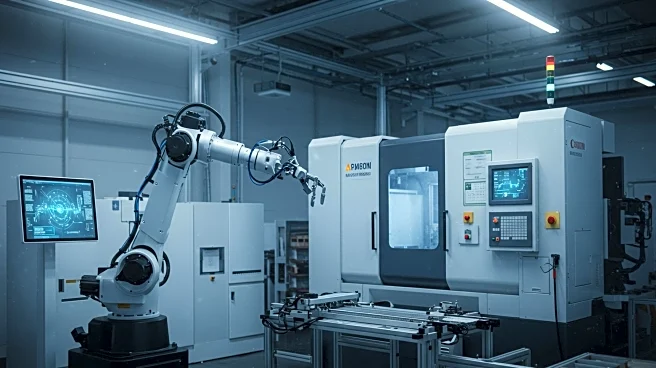What's Happening?
Rockwell Automation has released its 10th annual State of Smart Manufacturing Report, focusing on the Consumer Packaged Goods (CPG) sector. The report indicates a shift from short-term cost-cutting to long-term innovation strategies, emphasizing the integration of technology, workforce development, and adaptable manufacturing systems. Manufacturers are increasingly investing in artificial intelligence and robotics, with 70% of CPG manufacturers allocating resources to these technologies. The report also notes a rise in effective data usage for decision-making, from 40% in 2024 to 44% in 2025. Workforce strategies are evolving, with a focus on training existing employees and improving retention, rather than solely attracting new talent.
Why It's Important?
The shift towards AI and workforce development in manufacturing is crucial for maintaining competitiveness in a market with rising consumer expectations and private-label product growth. By investing in technologies that enhance workforce capabilities and operational efficiency, manufacturers can achieve sustainable growth and a competitive edge. This approach addresses the leading challenges in the CPG industry, such as competition, inflation, and economic uncertainty. The emphasis on long-term strategies reflects a proactive stance in adapting to market disruptions and consumer demands, potentially benefiting both manufacturers and consumers through improved product quality and innovation.
What's Next?
Manufacturers are expected to continue prioritizing AI and workforce development, with a focus on scalable and adaptable systems. This trend may lead to increased collaboration between technology providers and manufacturers to develop solutions that address specific industry needs. As companies invest in workforce training and retention, there may be a shift in employment patterns, with a greater emphasis on skills such as communication, adaptability, and analytical thinking. The ongoing integration of AI and robotics could also drive advancements in quality control, logistics, and cybersecurity within the manufacturing sector.
Beyond the Headlines
The report highlights a broader industry trend towards aligning technology with workforce strategies, which may have ethical and cultural implications. As AI and automation become central to manufacturing success, there could be discussions around the impact on employment and the need for ethical guidelines in technology deployment. Additionally, the focus on workforce enablement may lead to cultural shifts within organizations, promoting a more inclusive and adaptable work environment.









